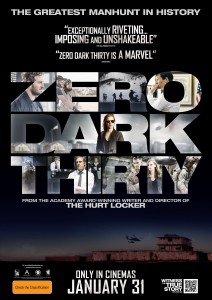Zero Dark Thirty and Torture in Film

Now that the Oscar nominations have been announced, movie buffs across the country can start speculating on what films will take home that iconic golden statue. Unfortunately, lost in all the glamour and pomp of the Oscars is something much more sinister: the normalization and promotion of torture.
I’m speaking of course about the new film Zero Dark Thirty, which recounts the story of Osama Bin Laden’s capture and opened recently in theaters nationwide. The film is currently up for “Best Picture,” and even if it doesn’t win it is likely to be a box office success. This is an extremely worrying development because the film goes out of its way to suggest that Osama Bin Laden was located and captured based upon information garnered through torture at the hands of Americans.
There are several reasons to be concerned, chief among them being that a whole segment of America will see this movie and may develop misinformed opinions about the effectiveness of torture and the validity of information that is derived from this barbaric practice. Studies have shown that torture consistently produces unreliable information, and those who have been tortured know just how inhumane it is. That’s why anti-torture advocates are worried that some Americans will become supporters of torture and the politicians that advocate for its use after seeing a movie that glorifies it in such a manner.
One group, the National Religious Campaign Against Torture, is working hard to fight against the normalization of torture. They recently hosted a webinar intended to unify anti-torture advocates and announce the beginning of their “Fact Not Fiction” campaign, which seeks to challenge misinformation about the effectiveness of torture as an interrogation technique. While the American Humanist Association is glad to work with religious groups on this issue, we also will be working with non-religious Americans to show that our community also opposes torture, but not because of scripture or religious teachings.
To humanists, torture is one of the worst things one human being can do to the other. Besides violating the human rights of the victim, torture attempts to remove any semblance of dignity from those it is inflicted upon in an effort to de-humanize those that we believe to be our enemies. Torture allows us to see our enemies as animals, not as something deserving of even the smallest amount of respect or sympathy.
Torture is that it doesn’t just affect its victims; it also permanently scars the torturers and their supporters. How can we, as a nation that tortures, also stand up for human rights and a fair judicial system? How can we ever criticize international dictators and authoritarians who brutally oppress their people if we in turn torture those who threaten our own power or stability?
Hollywood, as the world’s leading provider of entertainment, has a responsibility to be truthful and cautious about serious topics like torture. Many Americans develop their political opinions not just from what they hear their local politician say, but from news reports and cinematic retellings of political events. This is not to say that Hollywood should be censored from saying dangerous or even untrue things, but those who nominate films for Oscars should take in to account the impact of controversial movies like Zero Dark Thirty when making their choice. Art influences the world, and when art seems to approve of the use of torture, the audience may find themselves questioning whether America’s enemies deserve the same rights that they so thoroughly enjoy.
